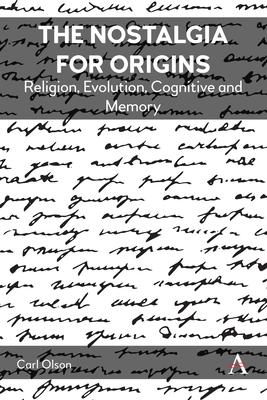
Book
The Nostalgia for Origins: Religion, Evolution, Cognition and Memory
by Carl Olson
(Write a Review)
Hardcover
$116.11
There are also other neglected aspects of evolution not discussed by previous theorists. The implications of the embodied nature of human beings are not always stressed by cognitive theorists. What they more specifically tend to neglect is that human bodies are chemical factories. It is numerous chemicals created within the body that contribute to the development of religious experiences. Another neglected aspect of those influenced by the theory of evolution is that early humans exerted a will to power to survive. This so-called will to power is a process of empowerment with the goal of enabling humans to become strong and powerful enough to survive. This will to power is not something metaphysical but is rather part of the dynamic of natural selection. It is possible to think of the proposed will to power within the operation of evolution as a thought experiment with the goal of enriching the theory of evolution.
With a review of the so-called Big Bang theory about the beginning of the universe, Darwin's theory of evolution, the quest for the birth of religion, and the cognitive contribution to this quest, the initial chapter commences a major theme of this book, namely the importance of origins. It includes an examination of the problematic nature of religion from a comparative perspective. Pre-historical times witnessed early Homo sapiens surrounded by danger as they attempted to survive. For our human ancestors, religion was not a way to get rich or to distinguish oneself from others, it was a means of survival. This was a perfectly natural development and response to one's hostile environment.
There are also other neglected aspects of evolution not discussed by previous theorists. The implications of the embodied nature of human beings are not always stressed by cognitive theorists. What they more specifically tend to neglect is that human bodies are chemical factories. It is numerous chemicals created within the body that contribute to the development of religious experiences. Another neglected aspect of those influenced by the theory of evolution is that early humans exerted a will to power to survive. This so-called will to power is a process of empowerment with the goal of enabling humans to become strong and powerful enough to survive. This will to power is not something metaphysical but is rather part of the dynamic of natural selection. It is possible to think of the proposed will to power within the operation of evolution as a thought experiment with the goal of enriching the theory of evolution.
With a review of the so-called Big Bang theory about the beginning of the universe, Darwin's theory of evolution, the quest for the birth of religion, and the cognitive contribution to this quest, the initial chapter commences a major theme of this book, namely the importance of origins. It includes an examination of the problematic nature of religion from a comparative perspective. Pre-historical times witnessed early Homo sapiens surrounded by danger as they attempted to survive. For our human ancestors, religion was not a way to get rich or to distinguish oneself from others, it was a means of survival. This was a perfectly natural development and response to one's hostile environment.
Hardcover
$116.11